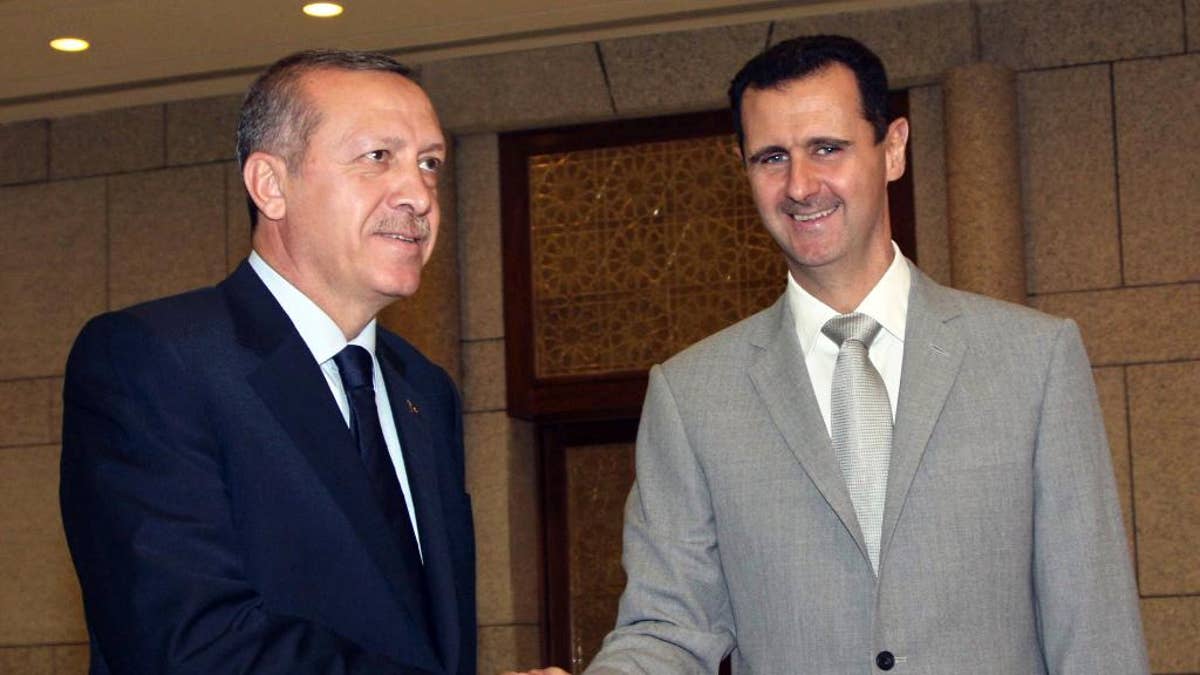
Syrian President Bashar Assad, right, shaking hands with Turkey's then-Prime Minister Recep Tayyip Erdogan in 2010. (AP Photo/Bassem Tellawi, File)
Turkish artillery shelled Islamic State targets across the border in Syria for the second consecutive day on Tuesday, a senior Turkish official said, amid reports that Turkey-backed Syrian rebels are preparing an offensive against an IS-held border town.
The latest developments have thrust the town of Jarablus onto center stage in the ongoing Syrian civil war, putting U.S.-backed Kurdish forces, who have been the most effective force against IS in northern Syria, on track for a confrontation with NATO ally Turkey over control of the town.
Jarablus is a vital supply line and the last border point that directly connects the Islamic State group with Turkey and the outside world, and separates Kurdish-controlled areas in northern Syria.
The town is 20 miles from the town of Manbij, which was liberated from IS by Kurdish-led forces earlier this month. Taking over Jarablus and the IS-held town of al-Bab further south would be a significant step toward linking up border areas under Kurdish control east and west of the Euphrates River.
The Ankara official said the Turkish shelling came after mortar rounds, believed to have been fired by the militants from Jarablus, landed on Turkish territory. The official, who spoke on condition of anonymity in line with government regulations, did not provide further details.
Turkey has increased security measures at its border opposite IS-held Jarablus, deploying tanks and armored personnel carriers in recent days. Turkey has also vowed to fight IS militants at home and to "cleanse" the group from its borders after a weekend suicide bombing at a Kurdish wedding in southern Turkey that killed at least 54 people, many of them children. Turkish officials have blamed IS for the attack.
Ankara is also concerned about the growing power of U.S.-backed Syrian Kurdish forces, who it says are linked to Kurdish groups waging an insurgency in southeastern Turkey.
A Kurdish-led group known as the Syria Democratic Forces earlier this month liberated Manbij, triggering concerns in Ankara that they would seize the entire border strip with Turkey. The U.S. says it has embedded some 300 special forces with the SDF. French and British special forces have also been spotted advising the SDF.
Syrian activists meanwhile say that hundreds of Turkish-backed Syrian opposition fighters are gathered in the Turkish border area of Karkamis in preparation for an attack on Jarablus.
Nasser Haj Mansour, an SDF official on the Syrian side of the border, said the fighters gathering in Turkey include "terrorists" as well as Turkish special forces. He declined to comment on whether the SDF would send fighters to the town, but a statement from the SDF said "we are prepared to defend the country against any plans for a direct or indirect occupation."
The reports and rhetoric appeared to set up a confrontation between the SDF, the most effective U.S. proxy in Syria, and NATO ally Turkey.
A rebel commander affiliated with the SDF was killed shortly after broadcasting a statement announcing the formation of the so-called Jarablus Military Council and vowing to protect civilians in Jarablus from Turkish "aggression."
Abdel-Sattar al-Jader was shot by unknown gunmen late Monday, an hour after he accused Turkey of mobilizing fighters and "terrorists" for Jarablus. Al-Jader had pledged to resist Turkish efforts to take control of the city and warned Ankara against further aggression. The SDF declared its full support for the council.
The Jarablus Military Council later blamed the killing of al-Jader on Turkish security agents. There was no immediate comment from Turkey. Haj Mansour said two suspects were in custody but declined to comment on their identities.
The Kurds' outsized role in the Syrian civil war is a source of concern for the Syrian government as well. Fierce clashes erupted between the two sides over control of the northeastern province of Hasakeh last week, and Syrian warplanes bombed Kurdish positions for the first time, prompting the U.S. to scramble its jets to protect American troops in the area.
The government and the Kurds agreed on a cease-fire Tuesday, six days after the clashes erupted. The Kurdish Hawar News Agency said government forces agreed to withdraw from Hasakeh as part of the truce.
Syrian state media did not mention any withdrawals, saying only that the two sides had agreed to evacuate the injured and exchange detainees. Government and Kurdish forces have shared control of Hasakeh since the early years of the Syrian war.
The Turkish Hurriyet newspaper and others said the mortar rounds Tuesday hit the town of Karkamis, in Turkey's Gaziantep province. One of them exploded in the garden of a house, but no one was hurt.
Anadolu Agency said Turkish artillery fired 40 rounds against IS targets in retaliation, after three rockets fired from Syria landed in an empty field in the town of Kilis. The report says the Turkish Armed Forces "covered the area with fire" without providing any details. No one was hurt by the rockets.
On Monday, Turkish artillery attacked a U.S.-backed Syrian Kurdish militia as well as IS positions in Syria.
Meanwhile, the Syrian army and its allies intensified their attacks on militant positions around the so-called military college in the northern city of Aleppo.
A video obtained by The Associated Press showed air raids, shelling and firing on the complex, which was taken over by al-Qaida-affiliated fighters earlier this month. Plumes of smoke were seen billowing overhead.
Russia's Deputy Defense Minister Anatoly Antonov said in emailed comments on Tuesday that Russia and the Syrian government will announce "the first 48-hour humanitarian break in hostilities" in Aleppo as soon as they receive an official request from the U.N. envoy for Syria, Staffan de Mistura.
